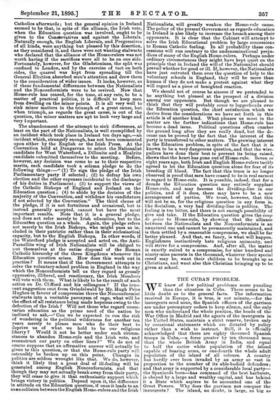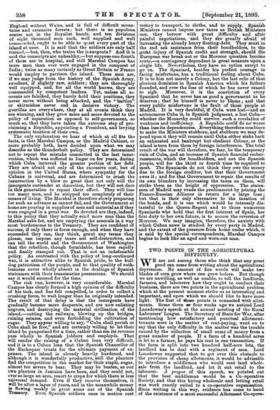THE CUBAN PROBLEM.
WE know of few political problems more puzzling than the situation in Cuba. There seems to be little doubt as to the general facts. The information received in Europe, it is true, is not minute,—for the insurgents send none, the Spanish officers of the garrison are under peremptory orders to keep silence, and the only men who understand the whole position, the heads of the War Office in Madrid and the agents of the insurgents in the United States, maintain a strict reserve, broken only by occasional statements which are dictated by policy rather than a wish to instruct. Still, it is cfficially acknowledged that there are eighty thousand Spanish troops in Cuba,—a force greater by ten thousand men than the whole British Army in India, and equal to half the entire white population of the island capable of bearing arms, or one-fourth the whole adult population of the island of all colours. A country has hardly ever been invaded by an army so vast in proportion to the number of its able-bodied defenders ; and that army is supported by a considerable local party— the Spaniards born—has command of the best harbours, is obeyed by a large and wealthy capital, and has behind it a State which aspires to be accounted one of the Great Powers. Why does the garrison not conquer the insurgents ? The island, no doubt, is large, as big as England without Wales, and is full of difficult moun- tains and extensive forests ; but there is no populous, centre not in the Royalist hands, and ten divisions of eight thousand men each, well supplied and well commanded, ought to be able to quiet every part of the island at once. It is said that the soldiers are only half trained,—but, then, who trains the insurgents ? And it is said the conscripts are unhealthy,—but suppose one-fourth of them are in hospital, and still Marshal Campos has more men than ever were engaged in the conquest of India ; twice as many certainly as Great Britain or France would employ to garrison the island. These men are, if we may judge from the history of the Spanish Army, excellent, if slightly raw, soldiers ; they are thoroughly well equipped, and, for all the world knows, they are commanded by competent leaders. Yet, unless all ac- counts are falsified, they barely hold their positions, they never move without being attacked, and. the "battles" or skirmishes never end in decisive victory. The guerillas are everywhere, they at all events thank they are winning, and they grow more and more devoted to the policy of separation as opposed to self-government, so much so, that they have taken, the extreme step of pro- claiming a Republic, appointing a President, and levying systematic taxation of their own.
The only explanation we hear of which at all fits the facts, is that Marshal Campos, or the Madrid Cabinet, or more probably both, have decided upon what we may describe as the thunderbolt pricy. They are determined not to repeat the mistake committed in the last insur- rection, which was suffered to linger on for years, during which Cuba incurred the greater portion of her debt. They are afraid not only of the excessive cost, but of opinion in the United States, where sympathy for the Cubans is universal, and are determined to crush the insurrection by a blow so great that not only will the insurgents surrender at discretion, but they will not dare in this generation to repeat their effort. They will lose too many men, and be stripped too completely of their means of living. The Marshal is therefore slowly preparing for such an advance as cannot fail, and the Government at home are pouring in supplies of men and material as if they were engaged in a great war. So devoted are they, indeed, to this policy that they actually send more men than the Marshal asks for, and are emptying the arsenals in a way most burdensome to the Treasury. They are confident of success, if only there is force enough, and when they have succeeded they can, they think, grant any terms they please, can impose any taxes not self-destructive, and can tell the world and the Government of Washington that the rebellion, though formidable, has been rapidly and finally stamped out. That is not an indefensible policy. As contrasted with the policy of long-continued war, it is attractive alike to Spanish pride, to the bull- dog patriotism of the people, and to that quality of ruth- lessness never wholly absent in the dealings of Spanish statesmen with their transmarine possessions. We should say it would succeed for the time.
The risk run, however, is very considerable. Marshal Campos has clearly formed a high opinion of the difficulty of his task, and has felt compelled, in order to collect a crushing force, to wait longer than he originally intended. The result of that delay is that the insurgents have gradually become more desperate, and are now enlisting negroes, and destroying the material civilisation of the island,—cutting the railways, blowing up the bridges, ruining estates, and even forbidding the cultivation of sugar. They appear willing to say, "Cuba shall perish or Cuba shall be free," and are certainly willing to let their island be pauperised for a time, rather than see its revenue pass wholly to Spanish jobbers and employs. That will render the raising of a Cuban loan very difficult, and it is to a Cuban loan that the Spanish Chancellor of the Exchequer trusts for the ultimate payment of ex- penses. The island is already heavily burdened, and although it is wonderfully productive, still the planters find the competition in the market for their staple, sugar, almost too severe to bear. They may be beaten, as our own planters in Jamaica have been, and they could not, over so large an area, resort to crops for which there is less universal demand. Even if they recover themselves, it 7111 be after a lapse of years, and in the meanwhile money is flowing weekly in great sums out of the Spanish Treasury, Even Spanish soldiers once in motion cost uatiney to transport, to clothe, and to supply. Spanish Ministers cannot impose new taxes as British Ministers can, they borrow with great difficulty and after painful negotiations, and they are greatly afraid of increasing the already heavy floating-debt. They must in the end ask assistance from their bondholders, to the .great injury of Spanish credit and strength, should the European war break out or the Morocco question become acute,—a contingency dependent in great measure upon a single life. Nevertheless, they have no option except to go on. The Spaniard, besides his perfect courage in facing misfortune, has a traditional feeling about Cuba. It is to him not merely a Colony, but the last relic of that glorious dominion in Spanish America which his fathers founded, and over the loss of which he has never ceased to sigh. Moreover, it is the conviction of every Spaniard that he never has as good a government as he deserves ; that he himself is never to blame ; and that every public misfortune is the fault of those people at Madrid. It is very doubtful, if Cuba were lost—and an autonomous Cuba is, in Spanish judgment, a lost Cuba— whether the Monarchy could survive such a revelation of weakness and inefficiency. A Republic could do no' worse than lose its dependencies. Everything therefore combines to make the Ministers stubborn, and stubborn we may de- pend upon it they will remain until Cuba either sinks back an exhausted and bankrupt but obedient Colony, or the island is torn from them by foreign interference. The total result of the war will therefore, we fear, be the-temporary ruin of Cuba, and an increase of Spanish financial embar- rassments, which the bondholders, and not the Spanish people, will for the third or fourth time be required to meet. The Spaniards do not think they owe the money due to the foreign creditor, but that their Government owes it ; and for that Government to repair the results of its own blunders by increasing the taxes on them, will strike them as the height of oppression. The states- men of Madrid may evade the predicament by joining the Franco-Russian Alliance in return for a large loan ; but that is their only alternative to the taxation of the bonds, and it is one which would be intensely dis- tasteful to the Queen-Regent and to those numerous Spaniards who hold that the first interest of Spain, her first duty to her own future, is to secure the reversion of Morocco. We may imagine, therefore, the anxiety with which Cuban news is studied by every party in Madrid, and the extent of the pressure from home under which, it is said by the special correspondents, Marshal Campos begins to-look like an aged and worn-out man.



































 Previous page
Previous page